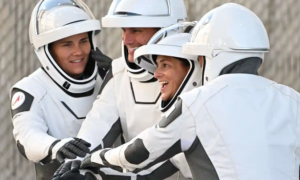Nicole Mann becomes first Native American woman in space on Crew-5 mission

Nicole Mann has become the first Native American woman in space as she lifted off in command of a flight to the International Space Station on Wednesday that also included the first Russian to join a US space flight since the invasion of Ukraine.
Mann’s journey on the launch vehicle, which consists of a SpaceX Falcon 9 rocket topped with a Crew Dragon capsule named Endurance, took off on schedule at noon from Nasa’s Kennedy Space Center in Cape Canaveral, Florida.
The four-member crew is scheduled to arrive at the ISS after about 29 hours, on Thursday evening, to begin a 150-day science mission aboard the orbital laboratory 250 miles (420km) above Earth.
The mission, designated Crew-5, marks the fifth full-fledged ISS crew Nasa has flown aboard a SpaceX vehicle since the private rocket venture, founded by the Tesla owner, Elon Musk, began sending US astronauts aloft in May 2020.
Mann, 45, is a veteran combat pilot who has made spaceflight history not just as the first indigenous woman in orbit but as the first woman to command a Crew Dragon capsule.
Her team includes the Russian cosmonaut Anna Kikina, who is hitching a ride alongside the American astronaut Josh Cassada and Japan’s Koichi Wakata.
Mann is a US Marine Corps colonel who flew combat missions in Iraq and Afghanistan and holds a master’s degree in engineering, specializing in fluid mechanics.
She is a registered member of the Wailacki of the Round Valley Indian Tribes. The only other Indigenous American to have entered orbit is John Herrington, who flew on a 2002 shuttle mission.
“I feel very proud,” Mann said of her historic trip before lift-off. “It’s important that we celebrate our diversity and really communicate that specifically to the younger generation.”
Referring to the excitement that her trip has generated among some Native American communities, she said: “That’s really, I think, an audience that we don’t get an opportunity to reach out to very often.”